
I recently wrote about beggars on the streets of Stockholm. I observed that an abundance of beggars are now stationed in the streets, and that they are mostly from Romania. I argued that these beggars are organized, and possibly trafficked, that a large portion of collected money goes to “bosses,” and that Swedes are naive and therefore an easy market for the begging enterprise, which is in large part social engineering. The article became quite controversial, especially in Sweden.
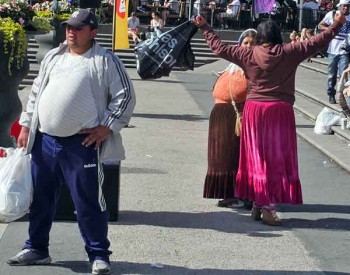

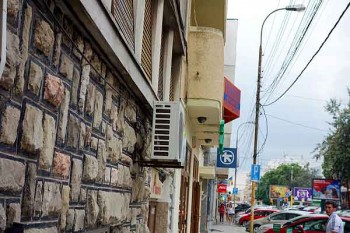
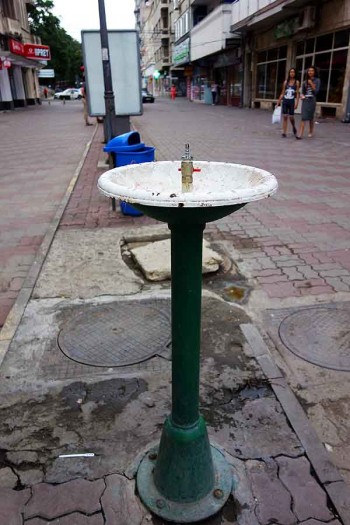
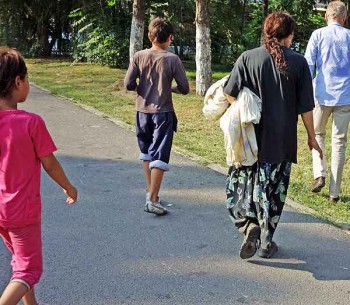

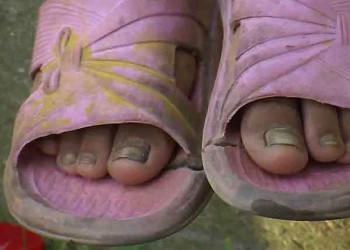

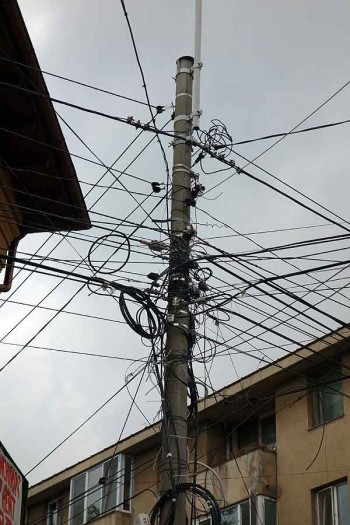
Now, after making a trip to Romania, I have some follow-up information. (But you have to read through my rant before you get it.)
Romanian beggars in Sweden
Swedes are reluctant to believe that their cities and towns have been besieged by professional beggars. Despite the thousands of Romanian beggars in evidence, Swedes stubbornly insist that these are simply individual unfortunate humans who can survive by no other means. For some reason, Swedes excuse them from working for a living. Despite the fact that the Romanian beggars (individually!) all use the exact same posture, the same dress mode, the same plastic bundles of personal effects, the same blanket-wrap and paper cup and laminated photo—even the exact same laminated photo of the very same children. Despite the fact that prime “locations” seem to be continuously occupied, with methodical rotations of personnel so that the position is never vacant, never vulnerable to being usurped by a competitor. Despite the fact that these locations follow a scheme favoring the doors of particular grocery and liquor stores and subway entrances, all over Stockholm and all over Sweden.
Really. Are these Romanian beggars—all the several thousands of them—each sole and separate individuals, each uneducated, each unable to work, each self-organized?
Is Sweden a country of ostriches with their heads buried in the sand? Not quite. Sweden holds a native population intensely dependent on social proof. Everyone is terrified of committing inappropriate behavior, voicing an unpopular belief, not conforming to the group mentality. Everyone’s afraid of appearing to lack compassion, sympathy, charity, and brotherly love. Everyone’s afraid of appearing racist.
For an excellent example of this attitude, take a look at an August 28, 2014 article in Metro, the free paper distributed on Swedish trains. “No, the beggars are not controlled by criminal gangs,” is a translation of the Swedish headline. Its main source of intelligence is a Swedish “homelessness coordinator.” I don’t know, but I would suspect that Romanians who occupy Sweden for the purpose of begging do not go to the state for housing. That’s why they have bosses! To organize them, find them places to sleep. Also note that they carry their possessions around with them in sacks, like old-fashioned hobos.
Other sources in the article tiptoe through their interviews, cautiously hedging with evasive statements like this police officer’s: “‘It is very difficult to say that begging is organized,’ says Stockholm Police Peter Enell.” The article also makes short shrift of the statements by “a police officer with roots in Romania.” To me, the Metro article is laughable. Have a look. Or don’t waste your time.
To find out more about Romanian beggars, Bob Arno and I went investigating in Romania.
We met with a highly experienced police officer and another official in the city of Constanta, neither of whom would like to be named. Both told us that Romanians who beg outside of Romania are definitely organized. (I did not ask about beggars inside Romania.)
I asked if poor villagers sought out begging gang-leaders for assistance, or if villagers were recruited by the gangsters. They are recruited, I was assured. They are desperately poor, and they are Roma. On their own, they could not afford foreign travel. They require the assistance of leaders (bosses, aka gangsters) who organize their transportation. Of course, these bosses must be repaid.
The police officer told us that local gangsters who head begging rings gamble away much of the bounty. Other investigations show that begging and pickpocketing proceeds transform destitute village shacks into relative mansions with European luxury cars parked in driveways.
The official pointed out a number of Roma men drinking on the sidewalks. They are robbers, he said.
The police officer said that people are still maimed for the purpose of begging. I did not get clarification, but I take this to mean that it is children who are maimed. The officer described a horrendous practice, in which adults push a child into slow-moving traffic. When the child is hit and injured, the adults demand cash on the spot from the driver in order to not involve the police.
It’s hard to believe that this barbaric savagery really happens. Yet, the officer told us that this exact atrocity had occurred only two days before our meeting, right in the center of town, in front of Tomis Mall (near where we found our pickpockets the next day). I can’t get the nightmarish image out of my head.
I must presume that the adults were not the parents of the child victim. Who is the child, then? Stolen? Purchased? Rented? I also presume that the child, with its unpredictable injuries, is intended to become a compelling beggar who will attract sympathy and more cash with its twisted limbs and scarred skin.
This anachronism is difficult to grasp in modern, civilized society. It’s impossible to imagine the desperation and cold-bloodedness that leads to such an industry.
(It brings to mind the 1989 novel Geek Love, by Katherine Dunn, in which a circus family man concocts chemical cocktails for his pregnant wife, thereby creating his own deformed children for his own lucrative freak show. However, those children are loved. Great book!)
Roma in Romania
Bob and I spoke with a gypsy family that happened to walk past us in Constanta, Romania. Our translator begged us not to, insisting that it would bring trouble and they’d demand money. He said they wouldn’t speak much Romanian and he didn’t speak any Romany. Bob persisted, and the family sat down in a nearby park, amenable and unperturbed.
They were clearly penniless. The mother’s clothes were black with muck and she carried a grubby blanket. The children, eight and eleven years old, were bright and alert. They answered Bob’s questions with the same trepidation any shy children would, glancing at their mother, who smiled back and nodded. The children attended school. The mother had not.
I was enchanted by the little girl, whose scarred and dirty face was beaming one moment, serious the next. Her radiant smile baring two chipped front teeth hinted of a tough life. Her rubber sandals were cracked, broken, and dirty. Her feet were caked with grime, her toenails chipped and encrusted. She wants to be a doctor.
The mother has five children: 3, 8, 11, 15, and 20. They live in a house where they pay a small rent. The children’s father is very ill, she told us. He was hit in the head recently. But she doesn’t drink or smoke, she emphasized, as if to counter an unsaid accusation. Also, her brother has been arrested and is in jail for two years. She didn’t elaborate, but added that she’s not afraid of police. She’s sad that she doesn’t have her own house—that’s her dream. To support her family, she collects plastic bottles.
“You ask hard questions,” our translator said, “very personal.”
Now Bob beat around a bush. Without asking directly, he tried to find out if the family had been approached by human traffickers or gangsters offering them a better life. He spoke directly to the children.
Our translator was not familiar with our peculiar area of interest and had no idea what we were getting at—which is just the way we wanted it. No interfering, no answering on behalf of the family or spinning their replies. It was interesting to observe his change in attitude. He softened toward the children, he was charmed by them, and impressed by the mother’s candid and sincere statements.
When Bob invited the mother to ask him questions, she had none. She simply smiled and said “I’m glad that you asked us all these questions and pleased that you are interested in our life.”
The family did not ask us for money, though we gave them some at the end. The children handled the bills reverently, then handed them to their mother. The woman was surprised and grateful.
Criminal Romanian begging rings
I have not seen any children (Roma or otherwise) begging in Sweden. I’m sure it wouldn’t be tolerated. However, Romanian children beggars and pickpockets are plentiful in England, Italy, Spain, France, and probably additional European countries, but those I have listed I have personal experience with.
Here’s a 2-minute BBC clip on Romanian child-beggars, human trafficking, begging-ring bosses, and new riches in poor Romanian villages.
http://www.youtube.com/watch?v=9n3K2OEmTe0







20 Comments
So well put, Michaela! I agree completely with your conclusion about Swedes, Sweden, and the growing problem of widespread begging. As you say, the national personality just cannot admit that a problem exists.
Your personal experience and insight make you uniquely qualified to comment, and I appreciate that you did. Having grown up with gypsy friends, you have a better understanding of the community than most.
Interesting article. I myself come from a town in the Czech Republic that has one of the biggest gypsy populations in the country.
I have both good and bad experiences with them as it’s with every ‘group’ of people – there are good and bad ones.
The problem is that most of them are unfortunately on the ‘bad’ side and the situation in which they find themselves from pretty much birth is just not helping them. They are not born bad, they are raised bad and our society is not helping them. However, to say that is a little unfair to the society as the society is fearful of them and their fears are not baseless: crime, lies, disinterest in work, purposely not even pretending to try to be a contributing part of the society … just having lots of kids for the sake of welfare money and then not taking proper care of them and/or organised crime/black market … When you see all that all the time, you start feeling like there is just something wrong with them.
On the other hand, I’ve met a few of them that were absolutely normal people, but the society’s preconceived notions (and unfortunately often right) of the rest of the group has prevented them from really making anything of themselves. They feel left out, hated, yet they don’t want to be part of the gypsy community as they don’t agree with their way of life …
I personally experienced being scared at night walking home as a group of gypsy men are yelling across the street they will kill me … and hearing stories from friends and family of being robbed by gypsy kids … as well as memories of hanging out with my gypsy neighbour who was such a nice strong girl, or my gypsy classmate who really was a great guy – I wonder what’s become of them.
Now I live in Sweden and I’m sick of what I’m seeing here. Beggars everywhere. Some of them can really get in your face, but nobody says a word. They are ‘obviously’ organised – it really doesn’t take a genius or any huge investigation to see that. There are some spots where they congregate and you can easily discern, who are the ‘bosses’ and who are the footmen … Swedes really are so insanely naive and gullible, I’m actually scared for them.
Now this whole thing is making some swedes exceedingly rasist and it’s starting to spark a problem in this country – a knee-jerk reaction that is not yet in full swing. People in general are really scared to speak out for being immediately labeled as a racist. Privately, they’ll tell you they hate it and don’t want it, but publicly you just get jumped by all the bleeding heart lefties who live in a lala land of saving the poor of the whole world. They have no idea what they are doing, no concept of what it would take. It’s just nice words all around and no basis in reality. It sucks for everyone.
[…] beggars and organized crime syndicates in Romania. I then traveled to Romania to further research organized crime and human trafficking of beggars (and pickpockets). The comments posted to these articles, and others, reveal the divisive split […]
Greetings Bambi Vincent and to whom this may concern,
After having spent a little over a year in Sweden I’ve unfortunately become accustomed to people from many different underdeveloped european countries scouring the streets and loitering about store fronts begging for money. I recently learned that a large concentration of them immigrate from Romania and Bulgaria. While there is much information concerning the matter I think that the situation is being handled lackadaisically and with little coordination between the evolved european and Scandinavian countries. This Article and many others have definitely shed some light on the subject, but I feel its necessary to take a more personal approach to perhaps provoke a movement thats based on the why so to speak. Now the why is obvious to anyone that takes the time to inform him or herself on the poverty stricken basis in which these Roma people choose to flee there countries. But the problem is that there is a large percentage of people who see these street dwellers as a nuisance and a small percentage who fell empathic enough to find out the why. There are only a small percentage of people who will go the extra mile to remedy this problem and thats what needs to change.
As an artist that has recently relocated from Los Angeles and is now operating out of Stockholm I plan to full dedicate my upcoming series with the intent of spreading awareness of the why to promote a much needed movement. I am however still particularly uneducated on the matter and welcome the sharing of any knowledge from anyone who’d like to contribute.
In the last week I’ve been working with a Romanian beggar with the attempt to gather a personal story that just may render the hearts and minds of many. With my upcoming series I’ll be attempting to convey the why, both through text and a series of paintings.
I am however in need of a Romanian translator and any pertinent information on the subject.
Thanks for taking the time to read my comment.
Dearest regards
Quanti.
Qbomani@gmail.com
Hey everybody—there are many more great comments over on another article of mine. See http://bobarno.com/thiefhunters/beggars-in-stockholm/#comments
Glad you liked my article, Kev, and thanks for adding your comments. It’s always interesting to hear a Romanian’s insight. I had no idea that “roma” was a made up term with political influences. Your final line, “to destroy the criminal networks, and implement an european wide program for integration,” is a tall order! Ideal—yes. But both seem unlikely to happen any time soon. I do believe that people should stop giving handouts, though. That is not a solution, and only prolongs and exacerbates the status quo.
Tracy, your story is interesting, too, and I thank you for sharing it. You’re right, they’re not all bad and lazy. But those who are decent, upstanding citizens disappear into the world with the rest of us, working and living responsibly. It’s only the bad and lazy that we see, and they give all the rest a bad name, unfortunately. Also unfortunately, there are many, and they intentionally make themselves very visible.
1st grade in a good school in Bucharest. We had two gypsy brothers in our class. One of them was 8 because he couldn’t pass the 1st grade, it wasn’t because he was stupid, but because the other children kept beating him and he kept having to stay home to heal his injuries. The two brothers lived in the building next to the school. They got beaten every single day they came to school and couldn’t learn anything because their mother had to pick them up from school every time they got injured. They had trouble reading and counting, nothing was going well for those boys. I took a stand and confronted my classmates. I was a small girl with big courage. This did not go unnoticed by the two brothers. They thanked me with tears in their eyes that were getting mixed up with the running blood from their noses. I told them that I will do my best to keep them safe. They said that I didn’t have to do that, that they understand, and that they were stupid, they deserved to be beaten. I was outraged, my father never lifted a hand against me and this was a completely alien notion to a 6 year old child. I hugged them. I didn’t know what else to say.
I found a kitten and taken it to the two brothers when my father didn’t let me keep it. Their mother was kind to me and shared sweets and milk from the little they had. The brothers have quit school after 2 trimesters. They were no longer getting an education. I could not be everywhere to protect them…
7 years later I went to a disco with a few friends, I was a blossoming young lady, and my boyfriend had to use the restroom. Whilst he was gone, three unpleasant individuals tried to get fresh with me. The two brothers were there, by chance, they stepped in and “rescued me”. I thanked them, and they told me: “No thanks needed, you are family, you stood up for us, if we’re around we would give our life to save yours” and i believed every single word. I teared up then, I hugged and kissed them both on the cheek. They are loyal to their family from what I’ve noticed.
My boyfriend arrived and got very upset and racist until I had a chance to explain. He told me not to associate with those kind of individuals. That they were lesser people. Again i stood up for them, and he let the matter go.
They are not all bad, they are not all lazy, they are not all uneducated by choice. Most of them have a hard time getting out of the vicious circle enforced by environment and by the rejection from community they try to integrate in.
Hi, I’ve read your article, found it by searching “romanian beggars” on google. I’m romanian, and would like to add some info on your article. Nice article by the way.
First of all I will refer to this minority as gypsies, “rroma” is a word invented to raise confusion with romanians, for the foreigner they are very similar.
I have not been influenced by anybody regarding gypsies, most of my experiences are first hand life experiences. From being sold fake products, physically assaulted by gypsies, harrased for money, and being thrown curse words.
I have learned to steer clear of these people, and avoid them at all costs. To the western people, this sounds like racism, but this is what we, in romania, have to do, to live a normal life.
The government has failed in it venture to integrate the gypsies into society, and now they are pouring into the west.
The beggars that you are seeing on the streets of Stockholm are organized, there is no way that they could get there on their own, they have no money, no education, and are illiterate. They are being controlled by a group of gypsy criminals, there are towns in romania where these criminal bosses built huge mansions and they drive arround in luxurious cars.
What I recommend people in sweden to do, is not give those beggars money. They are not helping them, they are contributing instead to the wealth of the criminal bosses.
The only way to help these people is to destroy the criminal networks, and implement an european wide program for integration.
Very interesting post. The Roma dilemma has become an increasingly stressful one. I live in the south of Stockholm and I’m in town daily. Folkungatan has now gone beyond a joke. The place is a real mess. Litter everywhere.
Beggars are competing for places on the streets and their methods are getting more and more invasive. Yesterday for example, I was enjoying a Thai meal with a friend, until two young Roma men saunter in off the street waving a Sofia magazine in my face (which is their equivalent of situation/big issue).
The pair proceeded to walk around in search of anything they could get their hands on. They came to a plate of left overs and began eating from it, standing nice and relaxed despite staff being present. One of them goes over to the cutlery, and helps himself to a fork and went back to eat from the plate. Then they left.
My friend was shocked. As was the man who worked there. Presumably Lebanese. He said to me in Swedish, “why is it everyone else has to work hard when they come to Sweden?” . A question I ask myself time and time again. why do these beggars expect to be given everything? They’ve just come to expect a free ride. The absolute gall of these people to come to a far flung land in droves and take advantage of it hosts good nature is bemusing.
I also read an. Article in metro describing the Romani beggars as EU migrants. A safe hedging phrase which could literally mean anyone that comes from the EU. I’m from Ireland. That makes me an eu migrant. I think swedes are so vocally oppressed, for fear of being branded a bigoted racist. In Ireland we still say what we see. In Ireland people will tell you straight what they think on any given situation. Which is refreshing.
Roma had flooded into Dublin am stayed until the economy crashed. Then they jumped ship. A night out in town became a nightmare. Hey were everywhere. Competing with heroin addicts. The mothers would sit with baby’s under their arms. Some people say they would sedate the kids in order to keep them docile. (I can only speculate on this).
They pushed the local beggars off their spots using intimadation and power of numbers. It’s happening here now as well. For example there’s an old man who has been selling situation magazine in slussen for years. It was his spot for the last 15 years. People knew him. Had a rapport with him. And looked after him. He was an alcoholic in and out of homeless shelters.
Since he’s been forced off his spot you can see he’s too scarred to go back and confront the beggars.
I always used to give change to them, but then you would pass at least 15 on the way to work. If you give 10kr per person that’s 150kr. I’m sick of beingbmento feel guilty every time I go for shopping by the two women outside my local supermarket. It’s become a gauntlet now. I try and go as little as possible from now on.
I think swedes need to wake up to this problem. They are such an easy target. It’s a Shame to see good people being taken advantage of.
My friend works in a chemist in the city centre. Back in January a lady bought a beggar woman a pair of spiked shoes for the snow. As soon as the lady left, the woman came in with the receipt. My friend said he reluctantly had to give her the money.
In terms of organised begging. I wouldn’t be too surprised. I’d say there is a mix of individuals who follow the migration. Along with people sent here. The Roma community need to be socially integrated the same way as everybody else. Workingnand paying taxes. There are people here in Sweden from far worse
circumstances who are here working hard and doing well for them selves. Naive and sympathetically biased articles in metro and expressen serve to do nothing other than muddy the water.
Sweden is a scammers dream. It’s ripe for exploitation. Stockholm was once a clean and safe town where the honour system was present and people lived a good moral code. It’s now starting to feel like any other City in Europe. Which is a real shame.
Thank you, M. I love hearing from Romanians. You have the advantage of your country’s experience and language, and some of you have spoken to the beggars. You raised many interesting points in your comment.
It’s terrible that all Romanians can be tainted by the reputation of the Romanian Gypsies. But I also wonder about that Gypsy reputation… how accurate is it? We all hear about the laziness, the criminal activity, the begging, their living off the system. But what percentage of the gypsies are like that? Most? Or are they simply the visible part of the population? Do we rarely hear of the hardworking, law-abiding Gypsies because there are so few? Or because there’s nothing to report about them? Are they 2% of the Gypsy population? Or 90%? There certainly does not seem to be a loud Gypsy voice defending the general population’s reputation.
Also, about the “job” of the beggars: yes, it does seem to be an unpleasant one. Maybe not difficult, but hard to sit still and uncomfortable for so many hours in awful weather. Pickpocketing must be a hard job too, with the verbal and physical abuse of victims, fear of arrests, and abuse by ring leaders. It would be much easier to do a regular, legal job. But that would mean commitment, motivation, and discipline.
And you’re saying that in the space of ten years or so, the Swede’s attitude has changed dramatically toward the Gypsies—and possibly even towards the Romanians in general.
There must be enough naive Swedes still giving though, or the beggars would give up and go away.
Hi , I m a romanian that lives in Sweden. I had interconected with gipsyes since chilhood. When I was little around 7 -8 years old a gang of gypsies robbed me several times. It was the same gang ,their parents that had ´´girls on duty´´ around the clock… My mother got robbed by them aswell. I had a period when I was thinking about me that I m racist and my family to because they raised me with the fraze : If you re not nice(good) they gipsyes will take you!. Now I don t think that , my children will hear the same fraze from me. In the neighbourhood that I lived(and I think the whole of Romania is the same) the gipsyes are the mafia. They are organized in clans and have alot of illigal activity drogs, credit cards home robbery, etc. I have a cousin that is police in Romania and he helped the illiterat gypsies to make passports and id .They went to Spain and Italy to beg and pickpocketing. In the little village wher my grandparents lived the gypsies had they re houses at the end of the village. Every time we visited my grandparents we passed the gypsie houses and they layed there on the pource , lot of kids and adultsd and deed nothing all day long and the yards looked uninhabited. Grandma was 75 AND ALONEand worked daylight around the house and there was not an empty spot uncultivaited… And then what I met in Sweeden: Nice people,helpfull very openminded, courious. That was for 10 years ago. And then came the plague. Beggers and thievs. The one begger I talked to he said when I asked WHy in hell he is not working: Don tyou thing this is a job? and a hard one!. After 10 years the nice and friendly sweds are reluctant and cold when they hear I came from the same country as the gypsies.
Most interesting to get a Romanian’s perspective, Marck. I wish you’d tell us more. You corroborate what I’ve read and heard for years, but I haven’t been to the small villages that have become wealthy with bad money. Have you spoken to the Rom people much? I’ve had fascinating conversations with some, through interpreters, in Spain, France, Italy, and Constanta. Not many Rom want to open up and speak freely to outsiders, but my husband somehow gets them to talk.
Here in Sweden, it’s hard to imagine that anyone would choose to sit in the snow, not moving, on the hard pavement, all day waiting for handouts. I would like to hear from them if, or how, they are forced by someone to spend those miserable hours.
There are discussions between Sweden and a Romanian minister right now, but these talks are ongoing, and nothing ever seems to come of them. All they succeed in doing is to recognize that the situation exists.
Tell us more from your side!
My friends i visited Stockholm in 2008 even then there was Romanians and RRom that,s the name for a gipsy witch is inappropriate because they are known like Cigans from ancient times in old Grece however you take a trip only in Constanta but you should take a trip in Strehaia ,Craiova ,Timisoara ,all over the Romania there are big houses build only from street crime but the bribe in Romania is too big and nobody say nothing . No RRom (țigani) ever paid taxes still they have big houses and last model of Lamborghini with money from begging and stealing and from many other crimes 🙂 i am a romanian living in Romania and driving a truck across Europe i know what i say 😉
So interesting, Skåne. Thanks a lot for taking the time to share your experience and perspective. Yours is a good counterpoint to mine and others’. My husband and I haven’t yet found a Romanian beggar who speaks enough English, Swedish, French, or German to have a decent conversation. Or, they pretend they don’t speak, possibly.
I have asked the opinion of many Romanians, though, in Romania, in Sweden, and in other parts of Europe. The opinion is unanimous among them: that these begging Romanians are Roma, and that the Roma (for the most part) do not have a tradition of holding a job. There are jobs to be had in Romania, but these people prefer to get money in other ways. To me, what they do IS hard work: sitting still, uncomfortable, bad living conditions, away from family, looking pathetic. But it does seem that they choose this lifestyle over the more conventional one.
Might you offer this young man some work? I’d love to hear how that goes. Seems you’d be doing him a service by allowing him to give value for money. Please let me know!
I have made contact with a Rumanien lad in Sweden. He sits from morning to evening outside a food shop whatever the weather. Many days the temperature is around or under zero degrees. I was curious about him and have on several occasions stopped to talk to him.
He is not illiterate and he seems candid and genuine. He went to school in Rumania and speaks English and a little Swedish. He is in Sweden with his sister and they both sleep in a tent.
I give him food, but not money and I see that others do the same. He smiles, is always polite and seems genuinely grateful. I have explained that people in this area are often unable to give money simply because, in this small and quiet area, they use credit cards for all their purchases. He says that people in Sweden are kind to him.
He has been approached by gangs of Rumanien men telling him that if he doesn´t agree to pay them, that they will ´remove` him. He says he is not organised and never will be. He would like me to ask around among my family, friends and acquainances for any work they may be able to give him.
Whether or not he is genuine I can´t know. But one thing is for sure: nobody chooses that lifestyle if thay have a better alternative. That is enough for me. I may be gullible, but this is a tough world and as a citizen in it along with everyone else, I believe we should do what we can to help those in need.
Olav, these people are poor and illiterate.
How do you explain other than by organized network so many of them were able to buy an airplane ticket?
If they are poor, from where have they got the money for the trip?
If they are illiterate, how were they able to book a flight?
It would also be interesting to know how did they enter Sweden – by road? by flight? by sea? by train?
Hi Olav,
I am not going to dispute any of your comments in your reply. Since our speciality is not Roma and how they live and interact in different countries across Europe. Our specialty is street crime, credit card fraud, and travel security. However, we do communicate intimately with many law enforcement agencies all across Europe and the Roma subject often pops up when researching pickpocketing and small time con games (like in Paris).
What is an absolute fact is that pickpocketing in Central Europe has many pickpockets from Roma background. That is indisputable. But you are equally right, that there is no evidence of the Roma visitors (or as you call them European migrants) doing pickpocketing in Sweden. And we do not say in this post that they are criminals. What we do suspect — strongly — is that this is a highly organized trade, with some suport of criminal behavior back home in Romania by the sponsors or organizers. Of course you can also say that berry pickers in the summer are organized and that the organizers of those people are just as immoral. The problem with organized begging is that it is not what it appears to be. It is deceptive, in or on many levels.
You quote Expressen, a Swedish evening newspaper as your support. I read that article and I think I can pick holes in practically every paragraph of justified logic — that there is no evidence of trafficking and organized begging. A few weeks later, a far more respected newspaper with better budgets for their research published a different article debunking the Expresson story and proving, as far as I can read it, unless every person interviewed were lying, that begging in Sweden is organized and run by pretty ruthless overseers. See the link here to Dagens Nyheter http://www.dn.se/sthlm/sa-tvingar-de-tiggarna-att-betala/ October 4, 2014, with the headline “This is how they force the beggars to pay.” But is it criminal? Probably not, just deceptive.
Is there a moral solution or ethical bottom line to all this? That’s for Sweden to conclude and agree upon. It comes back to EU and political opinion.
You are strong in your judgement about the Swedish police, the police in Romania. Are Swedes “thick” when it comes to travel scams and con games performed by visiting criminals? That is a different article. I would say that Swedes are suspicious, just as much as the rest of Europe but far less experienced in these matter, and therefore gullible. Would Swedes give as much to the beggars if they knew that they have to pay for there “spots?”
Bottom line thoughts after reading your comments, I truly don’t think we are spreading misinformation. We have many sources for our own work. Paul J. Polansky was a personal friend some years ago and offering us a great understanding of their plight for centuries. My own brother had a “sambo” for over ten years who was Central European Roma. Both offering counter points, but we have deep roots in other agencies today across Europe with different agendas – law and order. We really don’t want our blog to be a forum for back-and-forth opinions about this very sensitive and emotional issue, how to respect the Roma people (better). So I doubt I will continue to address viewpoints on begging in Sweden. Let the Swedes do that. As you have.
Bob Arno
Hej Olav, thanks so much for writing (politely). I appreciate your opposing viewpoint and find the entire Roma dilemma fascinating. You should know that this article was written by me, Bambi, not by Bob Arno. It’s true though, that we conduct our research together and often agree on the conclusions we come to and the gaping holes in our knowledge.
Bob will reply shortly, more thoroughly. Thank you for writing.
Really, Bob? You have one main source in your article, a couple of Romanian cops, who quite likely are prejudiced against the Gypsies and lying through their teeth. “Romanian officials” are not known to be especially trustworthy. http://www.huffingtonpost.com/adam-cernea-clark/romania-in-crisis-police-_b_4446185.html
That story about throwing your kid under a car is really old. I first heard it in Kolkata a long time ago (Calcutta then, where the streets were absolutely packed with beggars and of course they were “lazy”, “immoral”, “thieves”, “maiming their babies” etc ).
You give the Swedes a hell of a lot of unsubstantiated flack too. The usual hogwash about them being naive and gullible. How about calling them generous and compassionate for a change? Because that is what a lot of them are, except the 10 % who are outright racist, of course.
That said, I don’t support begging, and I never give to beggars. I do give however, to a number of other causes. Call me a “lefty hippie” – I don’t care. Better than being a right-wing bigot.
The Roma in Europe need to get organized and start changing their situation. Unfortunately, this is not going to happen for a generation or sot. How do I know? Well, I don’t get my information from The Daily Mail and Reddit, that’s for sure. I can recommend Mike Walsh’s book Gypsy Boy for a good read on what it’s like to be of Roma origin in modern day Britain. I translated that book to Swedish, as I did Geek Love, actually. Funny you should mention that.
The Swedish Police are generally a pretty thick lot, but if it one thing they are really good at, it is tracking Gypsies. Even if you are only 1/8 Roma you can be pretty sure that the cops have you registered. Anyhow, they have tried for years to gather evidence of trafficking and organized begging, but really, that is NOT the case in Sweden. Maybe in Spain and Italy. Here in Sweden the European migrants, as we call them,are guilty of very little, if any, pickpocketing or other petty crimes. http://www.expressen.se/kvallsposten/polisen-sanningen-om-tiggarna-i-malmo/
The last part of your article, the interview with the Roma woman and her children actually supports what most Swedes, both police, journalists and ordinary folk, already know. The beggars are dirt poor people who have found a way to make some money. A couple who leave their kids with the grandparents can bring home maybe 20 000 SEK from three months begging in Sweden, and that will tide the whole extended family over the winter in the slums of Constanta or Bucharest.
You are not doing us or yourself any favors by spreading this kind of misinformation. I took the time to reply politely and I hope you can respect that.
“This community crosses time and space with its traditions, and we in Europe have trouble to integrate them,” Alain Behr, a lawyer who has defended the Roma, told The New York Times. “Yet they have preserved their tradition, which is one of survival.” /Olav, Katrineholm, Sweden
[…] Edit: See follow-up article after our fact-finding trip to Romania. […]